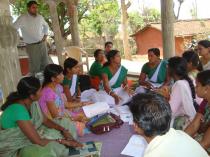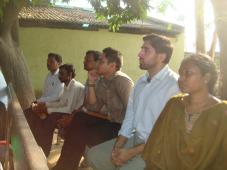Contribute
| Reflections On An Internship With MANSI |
Ashwin Advani
07/02/2013
(The article is brought to you courtesy AIF) The internship that moved me from Washington DC to New Delhi to work for the American India Foundation (AIF) was a turning point in my life. I chose AIF for many reasons, but mostly because it would help me get my foot in the door and gain experience in the field of public health while also contributing in a meaningful way. When I came in for an informational interview, I immediately felt comfortable with the AIF staff. I ended up spending the whole day at the Delhi office, talking at length with five different people, and even attended a site visit to the Naz Foundation, an AIF partner. I instantly connected with my potential (now current) boss Charu Johri, and knew she would serve as a great mentor. I currently work at AIF’s Maternal and Newborn Survival Initiative (MANSI), which seeks to reduce maternal and infant mortality with a concentrated approach in one of the poorest districts of Jharkhand, India. The district MANSI serves accounts for the highest levels of maternal and newborn deaths in the world. According to Save the Children’s 2013 report, more newborns die on their first day of life in India than in any other country. MANSI uses aproven Home-Based Newborn Care model and through a technical partner, enhances the capabilities of the community and existing health framework, particularly the female community health workers known as Sahiyyas. My work focuses primarily on documenting MANSI’s individual success stories and public health interventions. I started with a lot of reading and research on the issues surrounding maternal and newborn health, as well as background on the project. I found myself invigorated as I prepared for a field visit to Jharkhand. Among other responsibilities, I compiled and catalogued all of the existing case studies, performed redundancy checks, and analyzed what was missing and what information needed to be gathered. It was great to have the trust and understanding with Charu to control my own pace and workload, while also meeting regularly with her to discuss how to make the most out out of my time. In April, I had the privilege of spending a week “in the fieldâ€. I was naïve in my expectations of the villages in Jharkhand; there were no huts, but very clean small houses in some small or remote towns with shacks and small buildings. I worked with Bipin Rawat, a current AIF Clinton Fellowwho supports the MANSI project with AIF Project Manager Anupam Sarkar and TATA Project Manager Dibyahas Ray. Bipin and I spent a few long days in the field, meeting and interviewing local coordinators to reconcile case studies or, when possible, bring us to speak with Sahiyyas and beneficiaries. We also attended a training cross-visit – the Jharkhand government sent Sahiyyas from other districts to learn from the MANSI project. I witnessed a lot of the success stories of the program, and met positive and hopeful women who swore by healthcare skills that have helped them save lives. In the last village I was visiting, we came across a recent maternal death. It was something that shouldn’t have, but caught me off guard. The baby was still in a dire condition, and we were involved in the immediate analysis of the situation (gathering the story from the family, taking the temperature, weighing the baby, etc). The baby was identified as a low-birth weight baby. It has remained under MANSI monitoring and support for the last month in its recovery. After seeing and celebrating so many success stories, the last case impressed upon me the grave importance of MANSI’s impact using these seemingly basic interventions to save lives. The trip really motivated me further in this internship and my personal journey in gaining public health experience. It is obvious to me, how much people at AIF care about their work and projects. Staff is always in and out of the office traveling to and from the field and meeting with partners, and the office seems active and dynamic. In spite of all of these moving parts, there is definitely a sense of community within the organization. I can’t talk about my experience interning at AIF without mentioning probably my favorite part of the day – lunch. Usually outnumbered by Hindi-speakers, lunch consists of sharing home-cooked meals, coworkers asking me why I don’t want a roti or rice, seeing what different Western food Payal has brought, and discussing stories of the day – basically a true bonding environment. There are good restaurants in the Green Park area, but lunch in our conference room is its own Indian restaurant. I am lucky that many people have helped ease my transition and befriended me in this office. I am not sure where I’ll end up next, but I am very thankful for this opportunity to see the significance and impact of programs like MANSI, as well as to get to know the people behind it.
It is obvious to me, how much people at AIF care about their work and projects. Staff is always in and out of the office traveling to and from the field and meeting with partners, and the office seems active and dynamic. In spite of all of these moving parts, there is definitely a sense of community within the organization. I can’t talk about my experience interning at AIF without mentioning probably my favorite part of the day – lunch. Usually outnumbered by Hindi-speakers, lunch consists of sharing home-cooked meals, coworkers asking me why I don’t want a roti or rice, seeing what different Western food Payal has brought, and discussing stories of the day – basically a true bonding environment. There are good restaurants in the Green Park area, but lunch in our conference room is its own Indian restaurant. I am lucky that many people have helped ease my transition and befriended me in this office. I am not sure where I’ll end up next, but I am very thankful for this opportunity to see the significance and impact of programs like MANSI, as well as to get to know the people behind it.
You may also access this article through our web-site http://www.lokvani.com/

